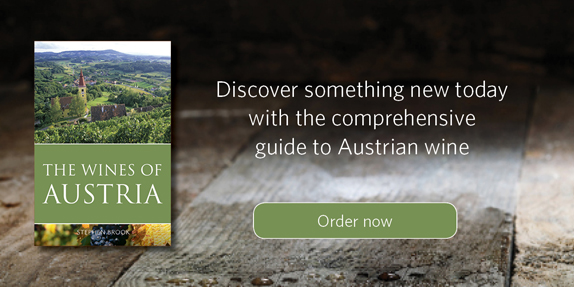The Infinite Ideas interview with Stephen Brook
9 November 2015 by Catherine Holdsworth in Classic Wine Library, Wine and spirits
Prolific wine writer Stephen Brook, author of The wines of Austria had a quick chat about his favourite subject.
Perhaps the best known Austrian grapes are Grüner Veltliner and Blaufränkisch. What are the characteristics of these grapes that make them best suited to be grown in Austria?
Gruner Veltliner is wonderfully versatile. It can produce crisp, refreshing wines for early drinking, and at the other end of the spectrum, powerful mineral wines that can age for decades, developing great complexity. The variety is grown in the Czech Republic, California, and New Zealand, but it rarely shows the typicity of the Austrian originals.
Much the same is true of Blaufrankisch. It can be produced as a simple, fresh red, rather like Beaujolais, or as a full-bodied, often quite oaky red with structure and weight. It’s a wine that should show good acidity, making it an ideal and versatile wine with food. It is also grown in Germany, under the name Lemberger, But it thrives best in eastern Austria.
What have been the biggest changes in the production of Austrian wine in recent years?
White wines, dry and sweet, have always been outstanding in Austria, but the real progress has been with red wines, which were frankly mediocre thirty years ago, but are improving all the time, especially now that the tendency to over-oak the wines is being increasingly resisted.
In The wines of Austria, you’ve written a lot about the producers of Austrian wine and how there are a lot of family-owned companies. Do you see more producers breaking into the trade? Do you think there is an opportunity for new varieties?
Austria doesn’t really need new varieties. It has a dozen varieties that have been grown with success for many decades, from scarce whites such as Zierfandler to indigenous reds such as St Laurent. Not to mention widely known varieties such as Riesling, Pinot Blanc, and Chardonnay.
Do you think global warming has affected the production of Austrian wine?
Hard to say, though the climate does seem to have been become more unpredictable.
Do you think that technology has generally been a good thing or a bad thing for Austrian wine production?
Modern technology, competently used, is always a positive thing, but most wineries don’t have the means for costly gadgetry and manage to produce excellent wines without it too.
Austrian wine has had some bad publicity in the past, and despite the fact that it was some time ago, that idea still resonates with many people; how would you convince today’s drinkers that it’s worth trying?
The so-called ‘wine scandal’ of 1985 was a serious betrayal of trust, but nobody got ill or died, in contrast to Italian scandals of the same era that resulted in multiple deaths from adulterated wine. So the Austrians have been published severely for their localised transgressions, but this is now long in the past, and the Austrian wine industry is as tightly controlled as any in Europe.
Wine-tasting is quite a specialised skill. How did you get into it – were you a natural or did you have to learn?
I had to learn, but I was also keen to learn, and paid to attend tutored tastings of top wines to learn how to appreciate them.
Can you tell us about the worst wine you have ever tasted?
Retsina from Greek cooperatives in the 1980s.
Who is the greatest character you have met during your long career in the wine trade? Can you tell us about him/her?
Too many to recall here: Robert Mondavi and Randall Grahm in California, Giacomo Braida in Italy, and, in Austria, the great Alois Kracher, whom I write about in detail in my book.
Other than Austrian wine what is your favourite drink – not necessarily alcoholic?
Top German Riesling.
The wines of Austria is available now, to purchase from Infinite Ideas at a special discounted price of £25.00, please email info@infideas.com or call 01865 514888

